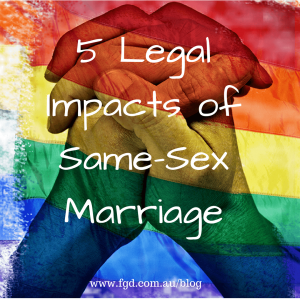
On Wednesday the Australian Bureau of Statistics released the results of the Australian Marriage Law Postal Survey. The results were 61.6% yes and 38.4% no. This means that we can now expect the Marriage Act 1961 to be amended to provide for same-sex marriage.
You may recall one of our directors, Kasey Fox, and I have previously written about the legal benefits of same-sex marriage from a family law perspective and from the perspective of wills, superannuation and inheritance rights. Both blogs argued for marriage equality.
This article discusses the legal impacts of same-sex marriage, from an inheritance law perspective.
Personally, I was thrilled by the public outpouring of emotion and relief from same-sex couples. You could see how important this outcome was to so many people, even the famously stoic Senator Penny Wong.
It was hard to miss the marriage proposals between same-sex couples. I saw some live on air and others I learnt about over social media during the course of the day. This was also really touching to see.
I certainly do not want to take away from the romance of these proposals – that should speak for itself. However, there is a benefit to being fully-informed about the practical impact of marrying another person.
Marriage is a formal legal process and there are real legal consequences to marrying another person that same-sex couples have not had to worry about until recently. So, while this blog is aimed at updating same-sex couples this is only because it is a new right that they can look forward to enjoying. However, the same advice applies to heterosexual couples as it impacts them in exactly the same way.
If you are thinking about getting married, then one of the many legal formalities you should consider is to seek estate planning advice from an experienced lawyer. If you have a question about Wills, estates, or estate planning then our specialist estates team can help you.
If after reading the below you are concerned about how your estate planning might be affected in your circumstances, then I am happy to provide you with a complimentary review of your Will and explain to you how marriage might affect your estate planning.
-
Marriage revokes a Will
The first thing you need to know is that marriage will normally revoke a Will. Inheritance laws vary from state-to-state, so the details of the revocation will vary depending on where you live when you get married.
If you are thinking about getting married and have gone to the effort of making a Will you may need to re-do the Will to ensure your estate passes as you intend it to. It is possible to make your Will so that it will not be revoked if you were to marry your fiancée.
-
Marriage revokes an Enduring Power of Attorney or Guardianship Appointment
All Australian jurisdictions allow you to appoint people to make decisions for you if you lose capacity.Again, the words and documents vary from state-to-state, but you may have prepared an Enduring Power of Attorney or appointed a Guardian to make decisions about your health and financial matters.
If you have done so and you later marry then you can normally expect that the marriage will revoke the Enduring Power of Attorney or Guardianship appointment.
It is sometimes possible to make the document so that it will not be revoked if you were to marry your fiancée but that depends on the document and the law of the state or territory.
-
Marriage may revoke a Superannuation Binding Death Benefit Nomination
Superannuation death benefits in most cases can be your most significant asset. However, every superannuation fund is different and this is part of what makes it so complicated.
Some superannuation funds – and possibly even some self-managed superannuation funds – provide that a binding death benefit nomination is revoked on the marriage of a member. This may have a considerable impact on the way your superannuation is divided.
You should contact your superannuation fund to find out if your BDBN will be affected.
-
Ending a Marriage may revoke a Will, Enduring Power of Attorney or BDBN
Some of these marriages will, unfortunately, end.
Divorce will have an effect on a Will, Enduring Power of Attorney and a BDBN. The effect varies from document-to-document and state-to-state. However, the effect will only occur when the divorce takes effect – so there are 12 months during which time your old arrangements may be highly inappropriate. This is particularly so in the period between when you separate and finalise any property settlement. We consider it essential to seek advice if you are married and separate.
When a divorce does go through it may well have a surprising or unexpected impact on your estate planning.
-
Keep your estate plan up-to-date
It is not enough to sign properly drafted Wills, EPOAs and BDBNs. You also need to review the documents every two to three years to ensure they are still doing what you want them to.This doesn’t mean you need to see a lawyer that often, but you should make sure it is still doing what you want it to. If you are not sure that it is, you should consider seeking legal advice.
Finally, in many cases BDBNs only last for three years. After three years they are no longer binding and the trustee of the superannuation fund has discretion as to how they distribute your superannuation. This can also have a significant impact on your estate plan and the effect of your Will.
Have questions about getting married and how it can affect your estate? Contact Farrar Gesini Dunn on 02 6257 6477 or send us a message.

Timothy Morton is an Associate Director and Estate Specialist in our Canberra Office.